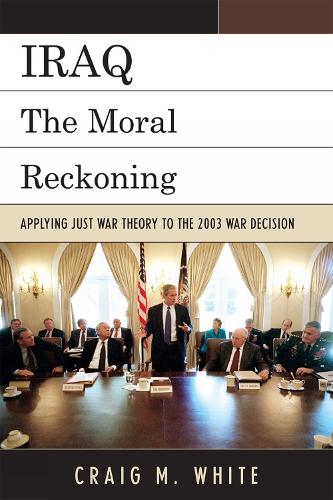
Iraq: The Moral Reckoning
(Paperback)
Publishing Details
Iraq: The Moral Reckoning
By (Author) Craig M. White
Bloomsbury Publishing PLC
Lexington Books
19th March 2010
United States
Classifications
Professional and Scholarly
Non Fiction
Military history: post-WW2 conflicts
Modern warfare
327.567
Physical Properties
Paperback
290
Width 156mm, Height 234mm, Spine 22mm
463g
Description
Iraq: The Moral Reckoning applies classic just war theory to the U.S. decision to go to war in 2003. That theory, which evolved over several millennia, is a simple, profound tool for evaluating the rightness and wisdom of starting a war. The Bush administration and its supporters referred directly and indirectly to the theory in making a pro-war case to the world. The theory provides three core moral criteria for a just war: sovereign authority, just cause, and right intention (which includes an aim of peace). It adds three practical criteria: proportionality of ends, last resort, and reasonable chance of success. For a just war, each criterion should be substantially met. Since war is destructive and each country is presumed to have the right to live in peace, the evidence in favor of war must be clearly stronger than evidence against it.
For each criterion, Iraq: The Moral Reckoning painstakingly weighs Bush administration statements, or those of its supporters, against evidence available at the time. A wide range of viewpoints and evidence is considered, and contrary arguments are refuted. One full chapter is given to neoconservative arguments on just war theory and its application from prominent war supporters. Each criterion, except sovereign authority, is shown not to have been met. The book concludes with a discussion of the implications of an unjust war for the United States and the world.
The intensive weighing of each criterion against the facts and the balanced approach make the book unique. By demonstrating a comprehensive application of the theory to one war, it not only sets a new standard for evaluating the 2003 Iraq war, but also shows how present and future wars can be better evaluated in moral and practical terms, based on knowledge available at the time.
Reviews
Craig White analyzes the U.S. decision to go to war in Iraq in terms of the moral justification for war, a topic too often treated superficially at best in our foreign policy establishment. With wars ongoing, and many advocating more wars, we would do well to look to Mr. Whites work to see what light the Just War Theory sheds on some of the most momentous decisions we face. -- Ron Paul
Craig White has written an exhaustively well-documented, scrupulously balanced, deeply scholarly consideration of the justice of the Iraq war, informed by the professional insights of a career diplomat. The work exemplifies intellectual courage and a profound love of country while finding the best attempts to justify the Iraq war egregiously defective. White dispassionately unmasks folly masquerading as perennial wisdom, willfulness as virtue, and pettiness as gravitas. What a pity that the sober judgment found in this book was lacking in those leaders given the crisis and opportunity presented by 9/11. History does not doom us to its repetition if we but avail ourselves of the perceptive insights White here offers us. -- Thomas Cavanaugh, University of San Francisco
The tragic strategic, economic, and humanitarian consequences of the U.S. invasion and occupation of Iraq have long been apparent. Craig White does an important service in taking a comprehensive evaluation of the critical underlying issue of the morality of the invasion itself, specifically its failure to meet widely-accepted criteria for a just war. As a career diplomat, White recognizes that such questions are of great importance not only to theologians and philosophers, but also to policy makers and ordinary citizens. He makes his case in a thorough and convincing manner. -- Stephen Zunes, University of San Francisco
A rigorous analysis and application of the six criteria of Just War Theory to the 2003 decision by the Bush White House to go to war against Iraq.White does an excellent job reviewing the history and importance of Just War Theory and gives us an excellent run down of the meaning and development of the six criteria.I highly encourage all Catholics and people who take war seriously (everyone should) to read this book. This book ought to serve as a guide to all consideration of future U.S. wars and the Catholic's response to them. * Layevangelist.Com *
White handles this extremely controversial topic in a fir, thorough, and nonpartisan manner, reaching logical conclusions.Military and civilian leaders, clergy, political theorists, and concerned citizens will all gain a deeper moral understanding of conflict by engaging the questions that White raises and refining their own ethical framework for determining justified force. * Military Review *
Author Bio
Craig M. White is public affairs officer at the U.S. embassy in Port Louis, Mauritius.
